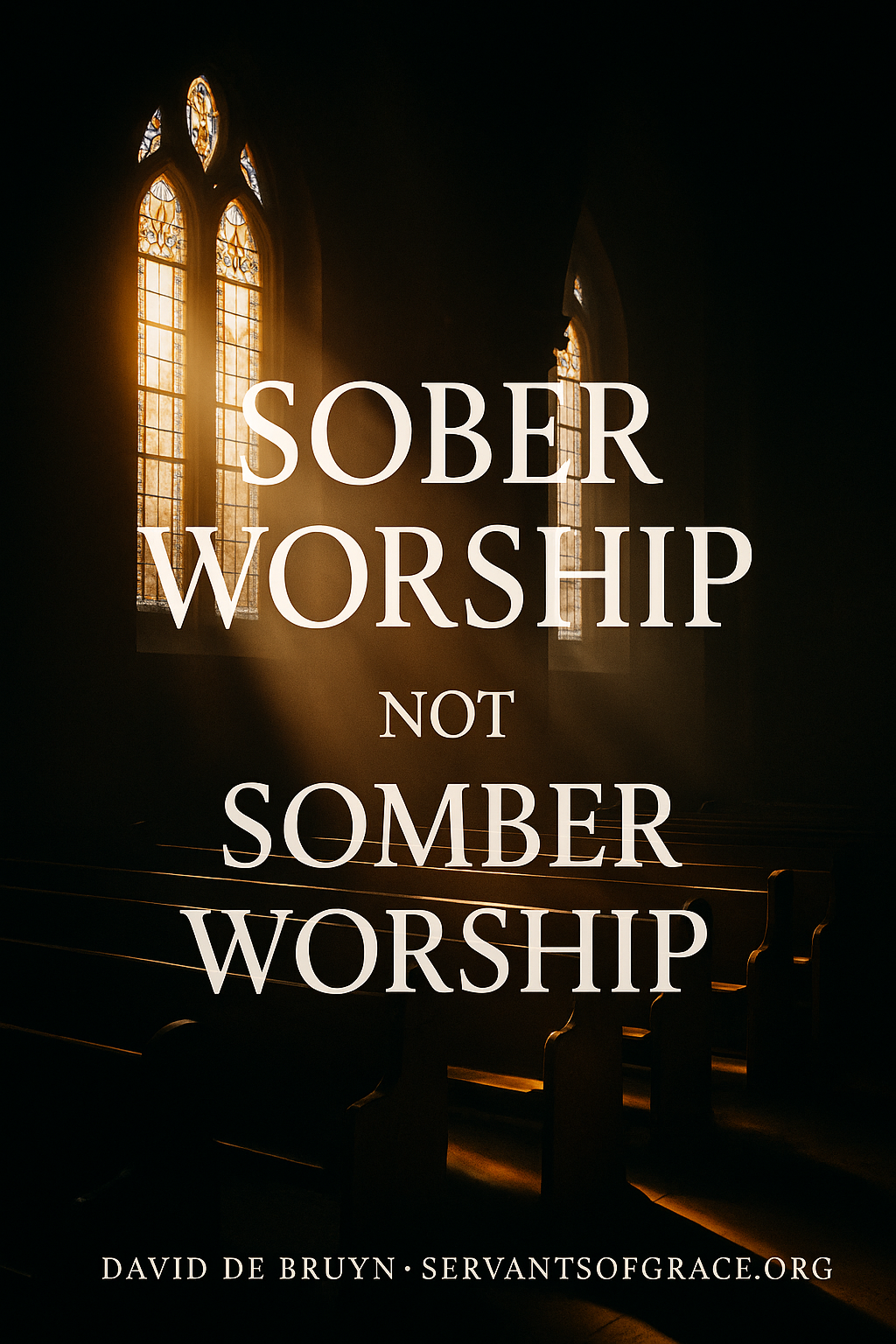⏱️ Estimated Reading Time: 4 min read
Sober Worship Is Not Somber Worship: Reverence and Joy in God’s Presence
Sober vs. Somber
By David de Bruyn
Sober and somber differ by only one letter, but they carry very different meanings. Sober in modern usage often means “not drunk.” In Scripture, its fuller meaning is clear-thinking, serious-minded, respectful, wise. A sober-minded Christian avoids the flippancy, silliness, and impulsiveness common to intoxication. A sober person takes life seriously and makes clear judgments accordingly.
By contrast, somber refers to a mood of heavy gloom or sadness, emotions devoid of joy or gladness. Derived from a Latin root meaning “under shade,” it describes melancholy, dullness, or depression.
Sadly, many confuse the two, especially in modern worship. Tell a modern evangelical that worship ought to be sober, and it is easy for him to hear, “worship should be gloomy.”
The Biblical Call to Reverent Joy
Scripture leaves no doubt that worship is to be sober. We are told to offer acceptable worship “with reverence and godly fear” (Hebrews 12:28). God condemned the flippant, casual, leftover offerings of the priests in Malachi’s day (Malachi 1:6–14). Believers are commanded to “serve the Lord with fear” (Psalm 2:11). Again and again, God calls His people to fear Him.
Yet just as clearly, we are told to “rejoice with trembling” (Psalm 2:11), to “serve the Lord with gladness; come before His presence with singing” (Psalm 100:2), to “come before His presence with thanksgiving” and “shout joyfully to Him with psalms” (Psalm 95:2). Scripture overflows with calls to joy in the worship of God.
Sobriety does not cancel joy, it includes it. We can be serious and glad at the same time, reverent while rejoicing. Except for brief seasons of contrition and repentance, a somber mood contradicts the Good News, casts a shadow on the empty tomb, and misrepresents the eternal joy of the Trinity.
What Sober Worship Really Means
Serious worship begins with sober judgment. Sober judgment considers:
- Who it is we worship and what He has commanded in worship.
- What He deserves, and what responses and attitudes correspond with His nature.
- The meaning of what we employ in worship — whether our sermons, prayers, readings, songs, and the music itself reflect reverent joy in response to a holy and good God.
The Dangers of Flippancy
Flippant worship inverts these priorities. Instead of submitting to God’s Word, it invents its own elements. Instead of considering what God deserves, it considers only what feels sincere, exciting, or satisfying. Instead of weighing meaning, it cares only for effect: Is it fun, familiar, nostalgic, crowd-pleasing?
Such attitudes reduce worship to human preference rather than God’s command.
Growing in Discernment
Sober judgment is not always easy. Discerning the meaning of music, mood, and method in worship is rarely simple. Mature Christians embrace this responsibility. As Hebrews 5:12–14 teaches, maturity involves setting aside childish avoidance of hard choices and practicing discernment between good and evil, better and worse, fitting and unfitting.
Those who dismiss such questions reveal a lack of seriousness about God. Serious Christians take God seriously. Therefore, they take worship seriously, and they take seriously the meaning of everything they offer to Him in worship.
“Serious Christians take God seriously. Therefore they take worship seriously.”
Reflection Questions
- Do my attitudes in worship reflect both reverence and joy?
- Am I more concerned with what pleases me in worship, or with what God has commanded and deserves?
- How can I grow in sober judgment when discerning music, words, and practices for corporate worship?
For more from our latest series visit: God’s Design for the Local Church and the Life of the Believer Archives – Servants of Grace
David de Bruyn was born in Johannesburg, South Africa, where he now pastors New Covenant Baptist Church and resides with his wife and three children. He is a graduate of Central Baptist Theological Seminary in Minnesota and the University of South Africa (D.Th.). David hosts a weekly radio program that is heard throughout much of central South Africa, serves as a frequent conference speaker, and is a lecturer at Shepherds Seminary Africa. Check out his website.




